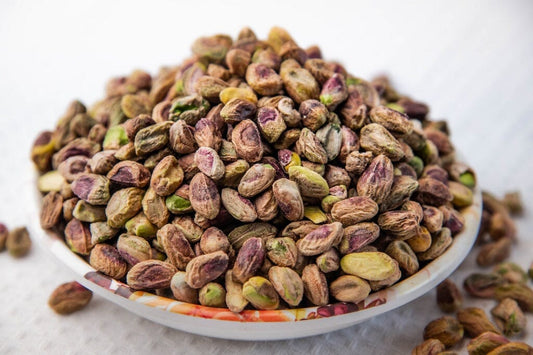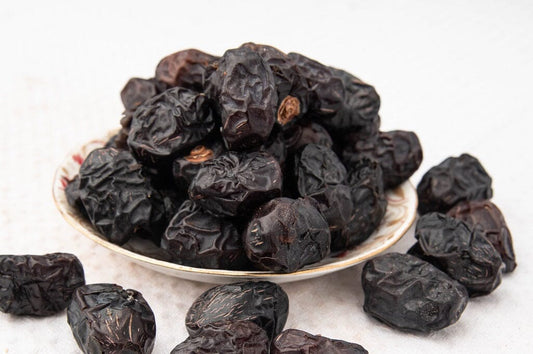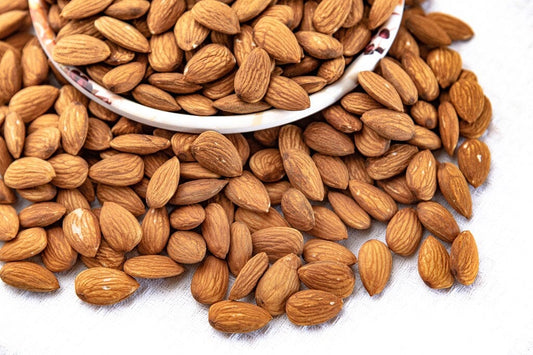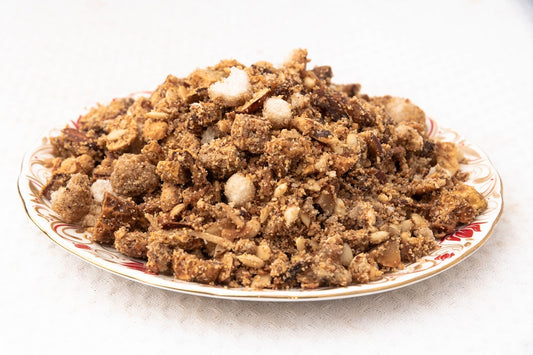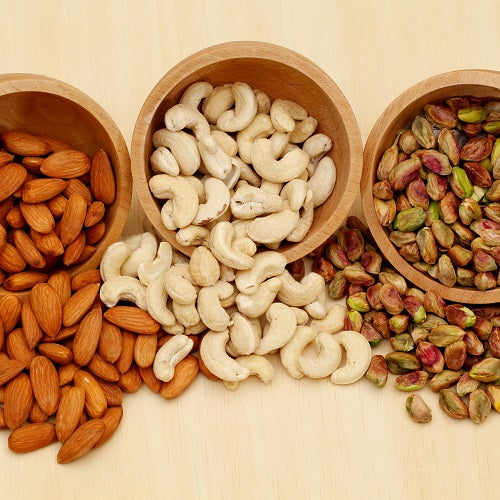Walnuts are rounded, single-seeded stone fruits of the walnut tree commonly used for the meat after fully ripening. Following full ripening, the removal of the husk reveals the wrinkly walnut shell, which is usually commercially found in two segments (three or four-segment shells can also form). During the ripening process, the husk will become brittle and the shell hard. The shell encloses the kernel or meat, which is usually made up of two halves separated by a partition. The seed kernels – commonly available as shelled walnuts – are enclosed in a brown seed coat which contains antioxidants. The antioxidants protect the oil-rich seed from atmospheric oxygen, thereby preventing rancidity.[1]
Walnuts are late to grow leaves, typically not until more than halfway through the spring. They secrete chemicals into the soil to prevent competing vegetation from growing. Because of this, flowers or vegetable gardens should not be planted close to them.
Walnuts have a delicious taste and crunchy texture, which is why they are used in many desserts and baked goods such as cookies, cakes, granola, cereals, energy bars, and the ever-popular banana walnut bread. Ground walnuts and walnut flour are also used for baking. Walnuts are packed with essential fatty acids and produce an oil that is a rich emollient and is known for anti-aging properties.
The nuts have always been considered as ‘brain food’ perhaps because the surface structure of the walnut has a wrinkled appearance, like that of the brain. Due to this reason, they have been considered as a symbol of intelligence, leading to the belief by some that they actually increase one’s intellect!
While this is not exactly true, recent studies have shown that the consumption of these seeds does help in promoting brain function. There are two types; black walnuts and brown walnuts. We shall be talking about the brown walnut in detail.

Vitamins and minerals
Walnuts are an excellent source of several vitamins and minerals, including:
Copper. This mineral promotes heart health. It also helps maintain bone, nerve, and immune system function.
Folic acid. Also known as folate or vitamin B9, folic acid has many important biological functions. Folic acid deficiency during pregnancy may cause birth defects.
Phosphorus. About 1% of your body is made up of phosphorus, a mineral that is mainly present in bones. It has numerous functions.
Vitamin B6. This vitamin may strengthen your immune system and support nerve health. Vitamin B6 deficiency may cause anemia.
Manganese. This trace mineral is found in the highest amounts in nuts, whole grains, fruits, and vegetables.
Vitamin E. Compared to other nuts, walnuts contain high levels of a special form of vitamin E called gamma-tocopherol.
Health claims
In 2016, the US Food and Drug Administration (FDA) provided a Qualified Health Claim allowing products containing walnuts to state: “Supportive but not conclusive research shows that eating 1.5 ounces (43 g) per day of walnuts, as part of a low saturated fat and low cholesterol diet and not resulting in increased caloric intake, may reduce the risk of coronary heart disease.”[12] The FDA had, in 2004, refused to authorize the claim that “Diets including walnuts can reduce the risk of heart disease”[13] and had sent an FDA Warning Letter to Diamond Foods in 2010 stating there is “not sufficient evidence to identify a biologically active substance in walnuts that reduces the risk of coronary heart disease.”[14] A recent systematic review assessing the effect of walnut supplementation on blood pressure found insufficient evidence to support walnut consumption as a BP-lowering strategy.[15]
As of 2021, the relationship between walnuts and cognitive health is inconclusive.[16]
Nutritional Value
Walnuts with no shells are 4% water, 15% protein, 65% fat, and 14% carbohydrates, including 7% dietary fiber (table). In a 100-gram reference serving, walnuts provide 2,740 kilojoules (654 kcal) and rich content (20% or more of the Daily Value or DV) of several dietary minerals, particularly manganese at 163% DV, and B vitamins (table).
While English walnuts are the most commonly consumed, their nutrient density and profile are generally similar to those of black walnuts.[10][11]
Unlike most nuts that are high in monounsaturated fatty acids, walnut oil is composed largely of polyunsaturated fatty acids (72% of total fats), particularly alpha-linolenic acid (14%) and linoleic acid (58%), although it does contain oleic acid as 13% of total fats.[10

Nutritional Value of Walnuts
According to the USDA Food Data Central, walnuts are a rich source of vitamin C, B vitamins (vitamin B6, thiamin, riboflavin, niacin, pantothenic acid, and folate), vitamin E, as well as minerals such as calcium, iron, magnesium, potassium, sodium, and zinc. [3]
Walnuts are 65 percent fat by weight and 15 percent protein. They are richer than most nuts in polyunsaturated fats (often considered the “good” fats) and have a relatively high amount of omega-3 fatty acid called alpha-linolenic acid (ALA). Walnuts are also particularly rich in an omega-6 fatty acid called linoleic acid.
Walnuts contain other essential nutrients such as beta-carotene, lutein, and zeaxanthin, as well as phytosterols. They are a good source of dietary fiber and antioxidants (ellagic acid, catechin, melatonin, and phytic acid). All of these beneficial nutrients contribute to walnuts being thought of by many as ‘power food’.
Health Benefits of Walnuts
Let’s find out some of the major health benefits of walnuts.
Improve Heart Health
According to the National Institutes of Health (NIH), walnuts are rich in omega 3 fatty acids that have been shown to help improve heart health. Fresh raw walnuts are rich in amino acid l-arginine, and monounsaturated fatty acids (72%) like oleic acid. [4]
It also contains essential fatty acids (EFAs), such as linoleic acid, alpha-linolenic acid (ALA), and arachidonic acids. The inclusion of these nuts in any diet can help prevent coronary heart diseases by favoring a healthy lipid supply.
A study published in the journal Metabolism suggests that consuming walnuts significantly lowered the LDL (bad) cholesterol and increased the level of HDL (good) cholesterol in the participants. Researchers at the University of Munich Medical Center, Germany, found that consuming walnuts also reduced ApoB levels, a marker used to evaluate the risk for cardiovascular diseases. [5]
Manage Weight
Walnuts help you feel full, which means that they increase satiety. Researchers from Harvard Medical School found that people who consumed shakes containing walnuts had an increased level of fullness during the day as compared to people who had placebo shakes. This study did, however, utilize a small size, so more research is needed to confirm these results. Regardless, the rich source of protein and fiber makes walnuts a healthy snacking option, especially for vegetarians. However, they should be consumed in moderate quantities as an excess of it could result in weight gain. [6] [7] [8]
Loose walnuts on a table Photo Credit: Shutterstock
Boost Bone Health
Walnuts contain copper and phosphorus both of which are essential in maintaining optimal bone health. Essential fatty acids found in walnuts secure the bone health of the body. They may increase calcium absorption and deposition while reducing urinary calcium excretion. [9]
Brain Health
Walnut oil contains omega-3 fatty acids, which can help improve memory and focus, says a report published in the Journal of Nutrition, Health, and Aging. Omega-3 fatty acids, coupled with iodine and selenium ensure optimum functioning of the brain. These nuts are included in the Mediterranean diet and they are also known to give relief from cognitive disorders like dementia and epilepsy. [10]
Antioxidant Power
Walnuts rank second on the list of ‘antioxidant-rich’ foods, just under blackberries as per research conducted by a team of researchers from the University of Oslo, Norway. The rare, powerful antioxidants such as quinone juglone, the tannin tellimagrandin, and the flavonol morin present in walnuts have remarkable free-radical scavenging power. These antioxidants also help prevent liver damage due to chemicals. [11]
Improve Metabolism
Walnut, along with EFAs, provides minerals like manganese, copper, potassium, calcium, iron, magnesium, zinc, and selenium to the body. These minerals help contribute to metabolic activities like growth and development, sperm generation, digestion, and nucleic acid synthesis. [12]
Control Diabetes
People suffering from diabetes may have walnuts on a regular basis since they contain a high amount of polyunsaturated and monounsaturated fats. Researchers say that the intake of nuts is inversely proportional to the risk of developing type-II diabetes. However, make sure to eat this nut in moderation. [13]
Cleanse Digestive System
This superfood helps to clean the internal digestive tract, aiding in detoxification by the removal of toxins and waste. It also cures constipation. Lead researcher Lauri Byerley, associate professor at the Louisiana State University in the United States, said in her research report that walnuts help the gut and have prebiotic properties. Eating walnuts daily increased Lactobacillus, Ruminococcus, and Roseburia which improved the gut function. [14]
Improve Male Fertility
Walnuts have a positive impact on male fertility by improving sperm quality, quantity, vitality, and motility, noted by a study published in the journal Biology of Reproduction led by Wendie Robbins, Fielding School of Public Health, University of California. [15]
Reduce Inflammation
The polyphenolic compounds and phytochemical substances found in walnuts reduce the effects of inflammation in the body. This has beneficial implications in a number of realms, including cardiovascular and oncology health. [16]
Pregnant Women
The rich source of vitamin B-complex present in roasted unsalted walnuts is essential for fetal growth. A study, published in the European Journal of Epidemiology, stated that when mothers consumed a diet rich in nuts (including walnuts) during the first trimester of pregnancy, there was an improvement seen in the neurodevelopment of the child. However, more studies are awaited to corroborate this point. [17]
Regulate Sleep
This nut makes melatonin, a hormone that helps induce and regulate sleep. Melatonin is present in the bio-available form in these nuts. In a research report published in the 2005 journal Nutrition, laboratory rats who were fed walnuts showed an increase in blood melatonin concentrations as compared to rats who were fed a controlled diet without the nuts. So, it’s best to add walnuts to [18]your dinner dishes to ensure a good, restful sleep.
Mood Booster
It is thought that insufficient amounts of omega-3 fatty acids (contained in walnuts and a few other foods), may cause hyperactivity, irritability, and tantrums. According to a 2016 study published in the Nutrients Journal, when healthy, non-depressed males were administered with walnuts, there was a significant improvement witnessed in their moods. Supplementing a child’s diet with these nuts compensates the deficit in EFAs and may help alleviate their mood. This is even applicable to people suffering from post-traumatic stress disorder (PTSD), who are battling depression and stress after trauma. [19]
Skin Care
The vitamin E and F content in walnuts help in maintaining and protecting the skin from harmful free radicals. It also helps in preventing wrinkles and dry skin. Regular use of walnut-based products lightens the dark circles under eyes. Walnut scrubs act as a natural exfoliator and help keep the skin young and fresh. [20]
Astringent Properties
Walnut oils have significant astringent properties. Toasted walnut oil has a rich, nutty flavor that helps bring aroma and flavor to the food. This flavor gives a pleasant taste, but only when it is used in moderation. It is used as a carrier/base oil in various therapies like aromatherapy, and massage therapy, as well as in the cosmetic and pharmaceutical industry. [21]
Boost Immunity
Regular consumption of natural shelled walnuts helps in building a strong immune system, which can prevent the onset of various diseases. The rich source of antioxidants, as discussed above, is responsible for this benefit. [22]
Hair Care
Walnuts are also responsible for healthy hair, as the high amounts of vitamins, minerals, healthy fats, and antioxidants strengthen hair follicles and make scalp dandruff free. They also provide thicker, longer and stronger hair. You could also use the husk of walnuts as a natural highlighter. [23]
Side Effects
On average, seven to nine walnuts per serving are considered safe for consumption. However, if you eat nuts in excess, there are some side effects you may experience, as follows:
- Allergy: Over- consumption may result in a range of allergic reactions from minor to lethal.
- Digestive issues: Excess intake of walnut may cause nausea, stomach pain, diarrhea, bloating, and more.
- Weight gain: Although it is a source of good fats, taking too much of this nut can make your weight rise like nuts!
- Pregnancy and lactation: Expecting and nursing women are advised to consume in prescribed amounts only. If you desire to increase its dosage, do consult your doctor.
Quick Serving Tips
Walnuts can be integrated into your diet to gain from all the associated health benefits. A few ways to add them to your meal are as follows:

